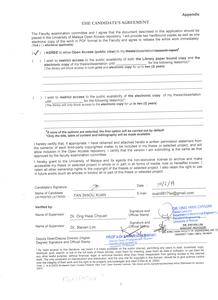Tan, Shiou Xuan (2019) Ultrasound assisted biodiesel synthesis from jatropha oilseeds using in-situ reactive extraction / Tan Shiou Xuan. Masters thesis, University of Malaya.
Abstract
Utilisation of edible feedstock in biodiesel production had caused food versus fuel crisis. Mechanical stirring was found to be a cost-ineffective approach as excessive energy was needed with the requirement for external heating while consuming more catalyst. Furthermore, several intermediate steps between oilseeds harvesting and biodiesel synthesis could be integrated, thereby simplifying the process and reduced the production cost. The main aim of the present study was to produce biodiesel with satisfactory fatty acid methyl ester (FAME) purity (≥96.5%) after two-step ultrasound assisted in-situ esterification and ultrasound assisted transesterification by directly utilising non-edible Jatropha oilseeds containing high acid value (AV) as feedstock. Ultrasound assisted in-situ esterification utilising sulphuric acid (H2SO4) as catalyst and the reaction parameters affecting the extraction, esterification efficiencies and FAME purity such as ultrasonic pulse mode, Jatropha oilseed particle size, n-hexane to methanol volume ratio, H2SO4 loading, reaction time and ultrasonic amplitude were investigated in detail. For ultrasound assisted transesterification, potassium hydroxide (KOH) was utilised as catalyst and the optimum reaction parameters of KOH loading, methanol to esterified oil molar ratio, reaction time and ultrasonic amplitude were investigated. Jatropha oilseeds before and after ultrasound assisted in-situ esterification were characterized and the fuel properties of the biodiesel produced were examined. The results showed that ultrasound assisted in-situ esterification obtained extraction efficiency of 83.96%, esterification efficiency of 71.10% and FAME purity of 38.58% at optimum reaction parameters of ultrasonic pulse mode 5s on/2s off, particle size of 1−2 mm, n-hexane to methanol volume ratio of 3:1, H2SO4 loading of 5 vol.%, reaction time of 150 min and ultrasonic amplitude of 60%. It was revealed from the results that ultrasonic pulse mode had significant effects on esterification efficiency and FAME purity. On the other hand, Jatropha oilseed particle size and n-hexane to methanol volume ratio significantly affected extraction efficiency. Other reaction variables (H2SO4 loading, reaction time and ultrasonic amplitude) had considerable effects on extraction, esterification efficiencies and FAME purity. The esterified Jatropha oil produced from esterification was then subjected to transesterification in order to further improve the FAME purity and minimized the AV to acceptable limit according to American Standards for Testing Materials (ASTM D6751) and European Union Standards for Biodiesel (EN14214). In the subsequent ultrasound assisted transesterification, high FAME purity of 99.03% and biodiesel yield of 85.20% were attained at KOH loading of 1.5 wt.%, methanol to esterified oil molar ratio of 12:1, reaction time of 15 min and ultrasonic amplitude of 60%. It was revealed from ultrasound assisted transesterification that ultrasound could produce biodiesel within a short reaction time while producing high FAME purity at the same time. In conclusion, ultrasound assisted in-situ esterification and transesterification can be a feasible biodiesel production method using solid oil bearing seeds directly without pre-extraction in the future. Detailed and in-depth information of the influence of each reaction parameters in ultrasound assisted in-situ esterification of Jatropha oilseeds on extraction efficiency, esterification efficiency and FAME purity was contributed to current literatures, specific to Jatropha oilseeds. These information would be crucial for the commercialisation of the process in the future.
Actions (For repository staff only : Login required)
![[img]](http://studentsrepo.um.edu.my/10623/1.hassmallThumbnailVersion/Tan_Shiou_Xuan.jpg)


